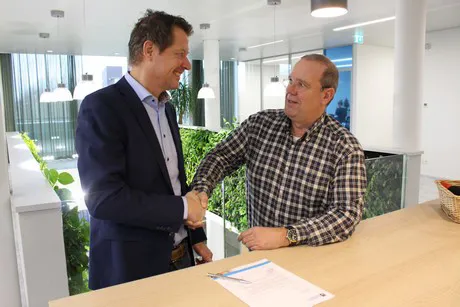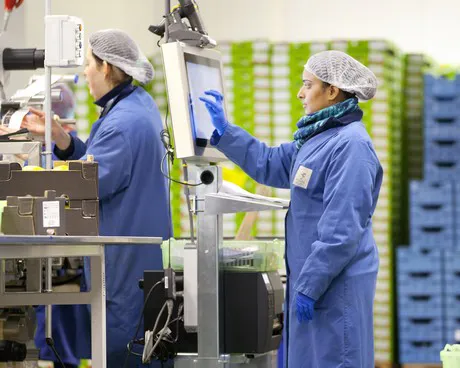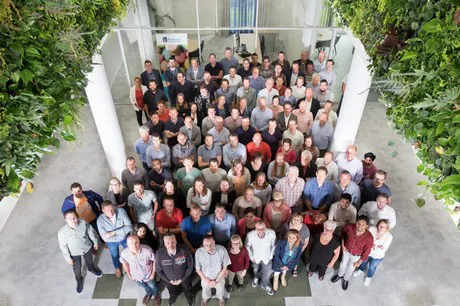In November 2017, Steven Doesburg joined Schouw Informatisering as commercial manager, and he is responsible for product development. When he started, he immediately announced he’s not the type to just mind the shop. He wasn’t exaggerating. With the speed of a 5G network, he and the rest of the MT implemented several changes to make the software company future-proof. At the turn of this year, he took over the role of CEO from John Schouw, who will naturally remain involved in the company. In an exclusive interview, Steven talks about his ambition to “continue staying one step ahead” with Schouw Informatisering.

Steven Doesburg and John Schouw
To see which course Steven mapped out for Schouw Informatisering, we first have to look back to the moment when Steven joined the company and started the transformation. As he announced, he didn’t just join to mind the shop, he overhauled the shop and created a new ‘shop lay-out.’ With a clientele consisting of 300 companies spread across 20 countries globally and a partner network, one question soon arose: “What can I add to that? That ‘addition’ consisted of the transformation of a traditional ERP supplier to an organisation that appeals to the needs and expectations of our target audience regarding company automation nowadays. A proven reliable company administration larded with implementation-oriented solutions and innovations, that will allow our customers to make a difference on the market. We should depart from the old ERP-unless thinking. With the introduction of the 365 platform, we acquire innovations that will change the standard in company administration,” he says. “The world is changing, customers have different expectations, as do the users of customers. You can’t show up with just another standard ERP story anymore.”
Digital transformation
Yet that is exactly what was happening, so what had to change? “I saw that this organisation had to go through its own digital transformation to bring a new product-market combination to existing and new customers.” Steven saw that with the available technology, innovative solutions could be offered. “That’s how we can make a difference, but it does require a change. We have to present the new story with a focus on the added value of innovations that are offered by the new platform, while retaining the good parts of the proven back office automation.” Not just commerce was done differently from then on, the changes could also be seen deeper in the organisation, in the administration, for instance. “We’re transforming from selling licences to licensing and service based on subscriptions, so customers are sent a monthly invoice based on their use, and which changes as a result of switching modules on or off. Customer Intimacy and user-friendliness are becoming even more important because of that,” Steven explains.
The Microsoft platform is the new basis of Schouw Informatisering’s software solution: Foodware 365, and this platform offers many possibilities. However, communication regarding this is crucial. “We have a message for members of the board, one for middle management and one for IT management for our customers.” That last group in particular is an important link. “You have to have a good message, because without the IT workers you’d miss an important influencer in a company.”

Innovative platform
‘Platform thinking’ had to become a central matter in the communication to customers. Microsoft once started with the aim that each desk should have a computer. That aim has been achieved. “Now they want to make innovations accessible to everyone: Democratisation of Innovation,” Steven says. With this vision, the software giant built an online platform that offers various innovations, such as the internet of things, machine learning and artificial intelligence, to partners like Schouw and their customers, without IT people or developers having to help. “Because of this, Schouw is capable of applying, and more importantly managing, these innovations in the field of action. This makes these applications accessible to our Enterprise target audience, but also to our SME customers, both nationally and internationally. That’s what we do.”
Steven clarifies using a cognitive intelligence service as an example. This service can recognise, for example, text and the emotion behind the text in an e-mail, but it can also recognise photographs. This is a similar technique as the one used during passport controls at airports, when cameras scan a traveller’s face and compare this to the photo in their passport and a databank of the military police. “Microsoft offers this service to us and our customers from their Azure cloud,” Steven says. “We add this innovation to our solutions for the food industry.”
That’s still quite technical, but Steven explains it further using an avocado as an example. “ We uploaded hundreds of photos of avocados with metadata into this cognitive service of Microsoft,” he says. When a customer receives a damaged avocado and sends a complaint e-mail with a photo, the system reads the e-mail and interprets the sentiment of the text. The photos are also looked at, and the software recognises quality differences. Based on all of this information, the complaint is classified and a workflow is started that is used to automatically create a complaint file to send to an employee. “That way, our customers can work more efficiently, more effectively and more focused on customers.” The only condition to work with similar techniques, is that the company’s data has to be in order. “Customers choose a platform for the next ten years, which gives them access to innovations and a safeguarded continuity combined with a proven back office automation,” Steven explains.
John Schouw continues to be a standard bearer
From the first successes as a result of the implemented changes and the carried vision within the management team, John believed daily management would be well taken care of in Steven’s capable hands. “John is a proper people person. He understands the matter and is very involved with customers, but he led this company for 20 years. This trajectory is a ‘hit refresh’ for the company, and he doesn’t want to be too involved in that. He wants to pass it on to a group of people who will become energised by guiding Schouw into the next phase.” By setting the course based on developments on the market and parting with daily management, John can focus on the company’s growth and customer contact more.
“It’s remarkably brave of John to have taken this step, because he’s practically given us, his management team, his wallet,” Steven says. However, John won’t disappear completely. “John has created a company with a flat structure, and he’s closely involved in all matters. He’s a bit like a walking history and the collective memory of the company. It’s his name on the building, so he has to continue to be involved. The company has become what it now is thanks to John Schouw.”

Start-ups, block chain and demand forecasting
Much has already changed in the past year, but ambitions go even further. Microsoft has two solutions, Dynamics 365 Business Central (previously called Dynamics NAV) and Dynamics 365 for Finance & Operations (F&O). The first solution has been the basis of Schouw’s branch add-on Foodware for 20 years. Seven years ago, the precursor of F&O (AX2012) was also added to the company’s portfolio. Last year, Schouw certified its Foodware 365 add-on for F&O. “We’ll also set up a global partner network for F&O. This is a typical product that’s positioned in the higher Enterprise segment.” This concerns large, often international, projects Schouw would like to do using so-called ‘Global System Integrator partners.’ Steven also sees opportunities to bind new partners to Schouw for Foodware 365 using Business Central. Existing (international) Microsoft partners with their own solutions who haven’t made the switch to Microsoft’s cloud platform yet have to make major investments to make that switch. “They can choose between starting anew and finding a partner who already has such a solution. In the latter case, they could come to Schouw Informatisering.”
The company’s focus has also been slightly adjusted. “Traditionally, we’ve always been focused on medium-sized and larger companies, but there’s a whole range of small companies I’d also like to serve,” Steven says. That’s why he wants to start a third branch this year, which will focus on start-ups and small companies with a suitable Software-as-a-Service proposition. That way, Schouw Informatisering wants to be able to support companies of every size, from start-up to multinational.
In closing, Steven mentions the new developments in the sector. For example, the company participates in a research project of Wageningen University, which studies applicability of block chain in the food supply chain, and they maintain a close connection to Erasmus Q-Intelligence, an initiative of the Econometrics Faculty of the Erasmus University. Econometrics students and professors are working on applications for machine learning and demand forecasting. “We want to be able to supply these types of innovations to our customers,” Steven concludes. “There’s plenty of ambition.”
For more information:
www.schouw.nl
www.foodware365.com
